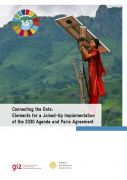Connecting the dots: elements for a joined-up implementation of the 2030 Agenda and Paris Agreement
National-level implementation of the 2030 Agenda for Sustainable Development and the Paris Agreement on climate change proceed on different tracks, despite growing recognition of the ample opportunities they present for synergies. In most countries, climate actions under the Nationally Determined Contributions (NDCs) and national targets underpinning the global Sustainable Development Goals (SDGs) have been defined and advanced separately. This siloed approach makes little sense given the short window of opportunity for tackling the interlinked challenges of climate change, ecosystem degradation, inequality rise, and political instability. Drawing on experience in 11 countries and the European Union, this paper provides core elements and concrete examples for jointly advancing these agendas, with a focus on five challenges: coordinating institutions, ensuring alignment and synergy of SDG and NDC targets, mainstreaming both sets of goals into policy planning, optimizing financial resources, and building mutually reinforcing monitoring and reporting frameworks. The research also explores how international development can better support national efforts at linking both agendas. This study shows that joining up implementation requires governments to make significant shifts in institutional, policy, financial, and monitoring frameworks that have the potential to generate clear benefits such as reduced transaction costs, enhanced policy coherence, and cost efficiency. Aligning nationally-relevant SDG targets and climate actions is a step forward, but a fully joined-up implementation would bring the two agendas into national and local policy planning in an integrated way to reduce transactions costs and foster win-win solutions


